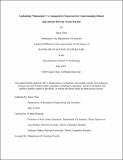Globalizing “Humanism”: A Comparative Framework for Understanding Ethical and Literary Revivals Across Eurasia
Author(s)
Chen, Jason
DownloadThesis PDF (904.7Kb)
Advisor
Denecke, Wiebke
Terms of use
Metadata
Show full item recordAbstract
Humanism is often framed through the lens of Renaissance Europe, where classical revival and secular individualism defined a powerful cultural ideal. Yet similar movements—grounded in ethical self-cultivation, textual engagement, and educational reform—have emerged independently across diverse historical contexts. This study offers a comparative framework for understanding four such revivals: Confucian classicism in Tang and Song China, Byzantine paideia under the Palaiologos dynasty, Renaissance Italy’s metaphysical humanism, and the Arabic Nahda’s reformist thought in the colonial age. Each reflects a distinctive negotiation between inherited tradition, moral agency, and sociopolitical upheaval. Five core features recur across these cases: a belief in human ethical potential, reverence for classical texts, dialogue with religious orthodoxy, institutional mediation, and the emergence of a learned elite committed to public responsibility. Beginning with China and moving westward, the analysis disrupts conventional genealogies and recasts humanism as a plural, adaptive phenomenon. Figures such as Han Yu, Liu Zongyuan, Theodore Metochites, Giovanni Pico della Mirandola, and Rifa’a al- Tahtawi exemplify the variety of humanistic expression, each articulating a vision of ethical renewal suited to their cultural moment. Rather than advancing a fixed definition, the project treats humanism as a historically contingent mode of reflection on what it means to be human—one that emerges in response to crises of meaning, legitimacy, and identity. Across Eurasia, literary and intellectual revivals have served as means for societies to reimagine moral authority, reassert cultural identity, and envision more just forms of life. Reconsidering humanism in this way not only recovers overlooked traditions but enriches the vocabulary available for confronting contemporary challenges.
Date issued
2025-05Department
Massachusetts Institute of Technology. Literature SectionPublisher
Massachusetts Institute of Technology